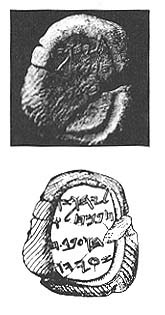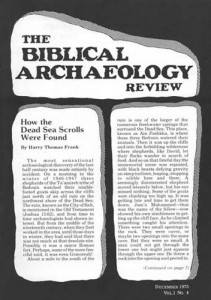
In the late eighth century B.C., when Sennacherib, King of Assyria, sent messengers to Hezekiah, King of Judah, to demand the surrender of Jerusalem, Hezekiah dispatched three senior officials to negotiate with the Assyrian messengers. When the negotiations proved unsuccessful, Hezekiah sent these Judean officials to the prophet Isaiah to seek the prophet’s advice. (2 Kings 18–19; Isaiah 36–37.)
One of these senior Judean officials was a man named Shebna. In the early 1950’s Nachman Avigad of The Hebrew University, one of the world’s greatest living epigraphers, startled the scholarly world with a brilliant decipherment of a tomb inscription in the village of Silwan, on a hillside facing Jerusalem. The inscription revealed that the tomb might well have belonged to this same Shebna mentioned in the Bible.
One of the other senior Judean officials of Hezekiah’s court was Eliachim, son of Hilkiah, who was at the time in charge of the king’s household. Recently the Israel Museum acquired a seal impression which may be stamped with the seal of Eliachim’s brother who apparently also served in Hezekiah’s court.
The seal impression consists of an inscription which reads “Belonging to Yehozarah, the son of Hilkiah, servant of Hezekiah” (see illustration). That Yehozarah, like Eliachim, also serves in Hezekiah’s court and is the son of Hilkiah makes it likely that he is Eliachim’s brother.
Already a library member? Log in here.
Institution user? Log in with your IP address.

